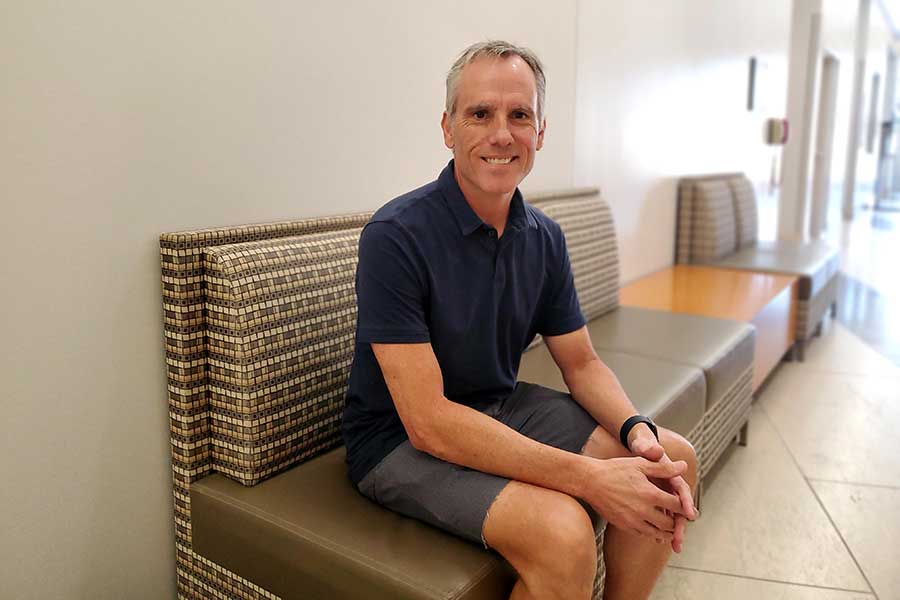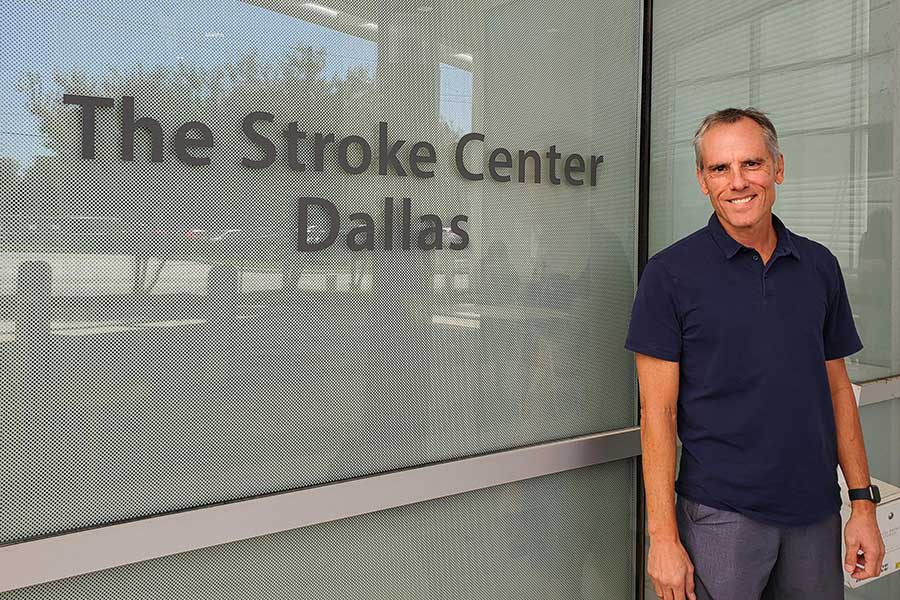Center helped stroke victim reclaim language skills

October 5, 2022 — DALLAS — On Oct. 12, 2019, Patrick Prock lost language. The words and sentences he wanted to say and the stories he wanted to tell were in his head. They were just too difficult to utter.
It was on that day Prock suffered a stroke and spent two weeks in the intensive care unit. Diagnosed with profound global aphasia, he was unable to verbally communicate. Aphasia is a language impairment caused by an injury to the language areas of the brain. One of the most severe types of aphasia is global aphasia, which is when multiple parts of the brain responsible for processing language have been injured.
Prock couldn’t verbally communicate with his children. He couldn’t talk to his parents on the phone. Out of frustration, he cried.
Three years later, Prock is blossoming. While learning to communicate again at The Stroke Center - Dallas on the Dallas campus of Texas Woman’s University, Prock found language again. He had to learn how to connect sentences together and strategies to find those stubborn words. His new voice is less reserved. The 55-year old relishes being able to talk again and not just to family and friends, but to volunteers at the food bank and people at the gym.
“I am different after my stroke, and I think for the better,” Prock said.
Prock has a warm presence and a gentle smile that relaxes new patients at the center. He has become an ambassador of sorts for the center, not just for what he has overcome but also for how he helps new patients. He was asked to speak at the center’s 30th anniversary celebration, on Oct. 13, 2022, which is one day after the third anniversary of his stroke. While the center is celebrating its longevity in serving the Dallas-area community, Prock is celebrating his voice and his new life, which is different than before but more fulfilling.
“Patrick is a wonderful support for our patients,” stroke center director and professor Jyutika Mehta said. “He has really brought our younger patients along. He has given them hope.”
“If there is a stroke patient, I can speak to them,” Prock said. “Look at me. You can do that too.”

When he arrived at the Stroke Center in February of 2020 four months after his stroke, he could say a few words. The word valentine was out of his reach.
“I was not talking,” Prock recalled.
During his two and a half years at the center, Patrick’s aphasia improved from severe to mild. He worked individually with speech-language pathology graduate students, who are overseen by the department faculty (who are licensed speech-language pathologists). The sessions are tailored for each individual, based on their speech, language and cognitive deficits, and are one of the unique aspects of the center.
“Our program is set up as an intense, impairment-level treatment program,” Mehta said. “At the Stroke Center, patients are here three days a week and receive three to four hours of individual daily therapy, group sessions and labs that assist with the technology aspect of the language”.
“You have to concentrate but it’s better,” Prock said of the intense therapeutic regimen. “And afterward, you have to rest and come back on Monday.”
“We know from research the brain requires practice,” Mehta said. “Any time you provide intensive intervention that addresses impairment, you are working to get the neurons reconnecting and pathways get strengthened. And that does require daily practice.”
Another interesting facet of the center is the cost. The Stroke Center does not charge patients for any services. Funding is provided by grants and contributions.
Initially, Prock was nervous during his individual sessions. A breakthrough came when his sister suggested that he use Zoom at home to communicate with family. It started as one-on-one video chats but has progressed to group chats with friends and family. In front of his loved ones, he was relaxed and comfortable and was able to practice the skills he learned in his sessions.
By the fall of 2021, he was stringing together groups of words and working on narratives with the graduate students. He could tell a story.
“The best thing about TWU was the narratives,” Prock said. “I had sentences. They helped me so much. Every day, Monday, Tuesday, Wednesday, I would work on my stories. They would get longer. Now, I can speak.”
Prock graduated from the individual sessions to group sessions after a year. Within those group sessions, he began to form friendships with other patients. He started volunteering at the food bank and persuaded his new friends to join him. He met people at the gym who didn’t even realize he had suffered a stroke. Prock is hoping to fully graduate from the center soon and add more chapters to his life story.
“I know I have aphasia,” Prock said. “There is no cure, but I have goals. Because I want to speak.”
Media Contact
Amy Ruggini
Digital Content Manager
940-898-3628
aruggini@twu.edu
Page last updated 8:53 AM, January 13, 2023